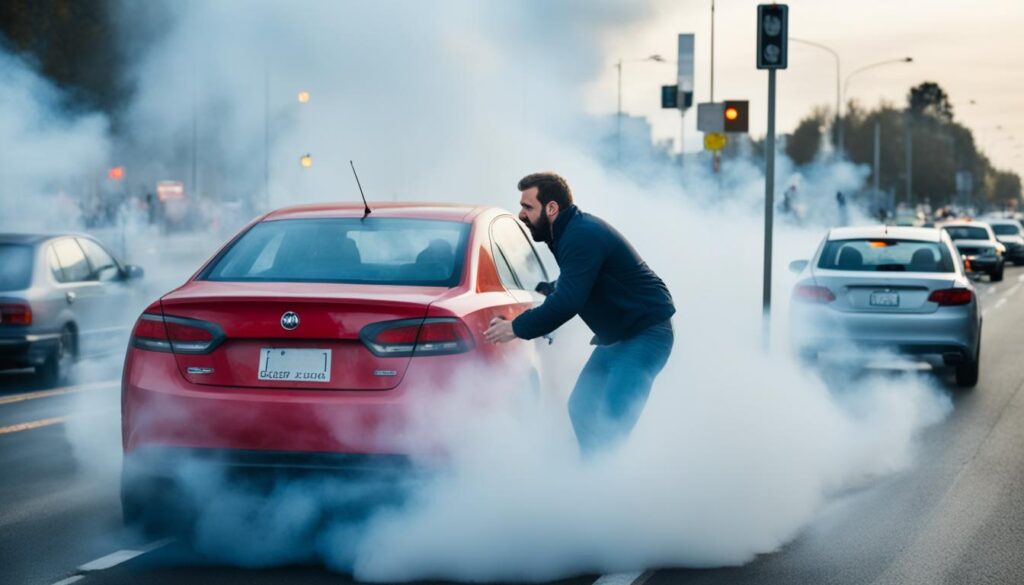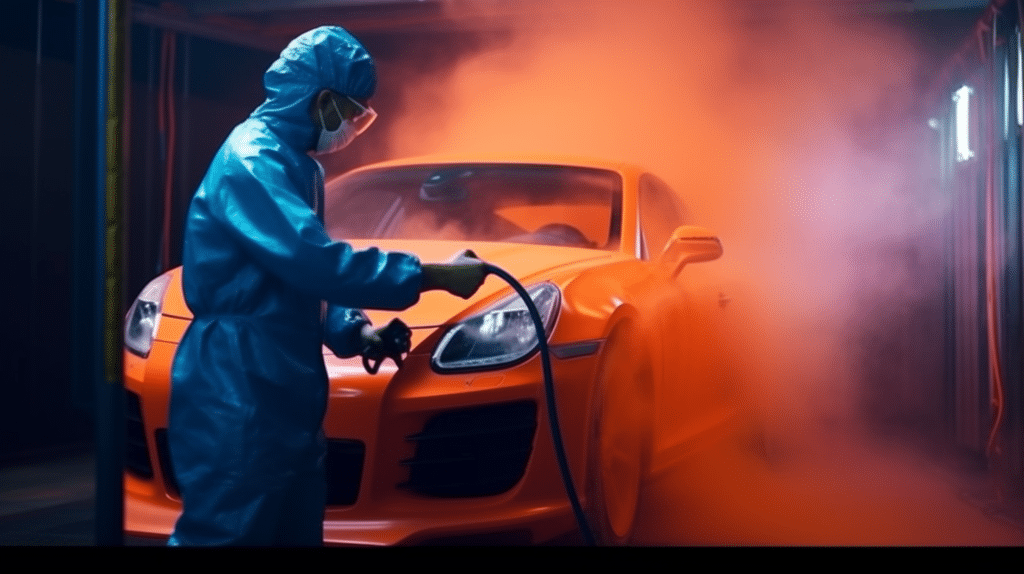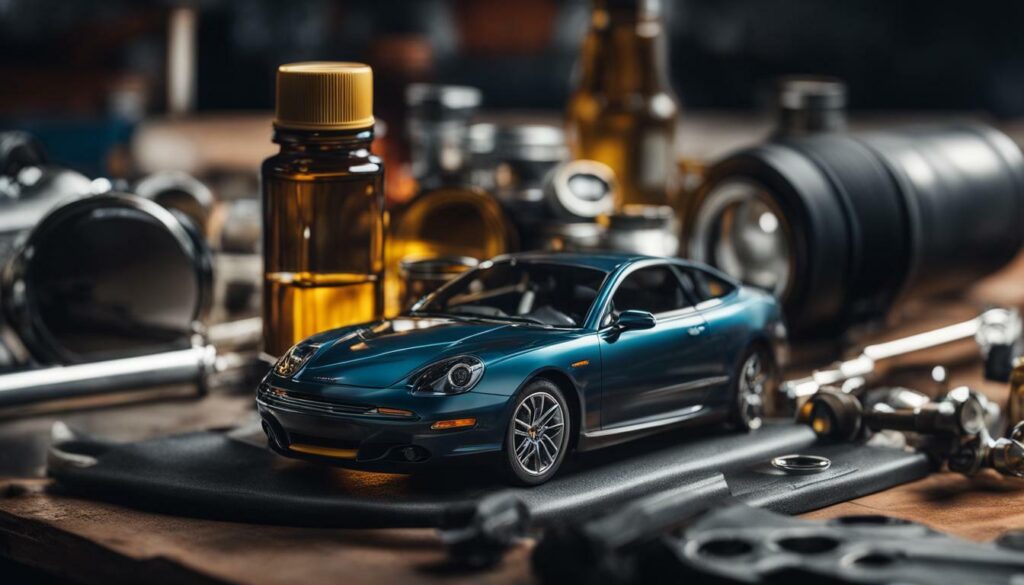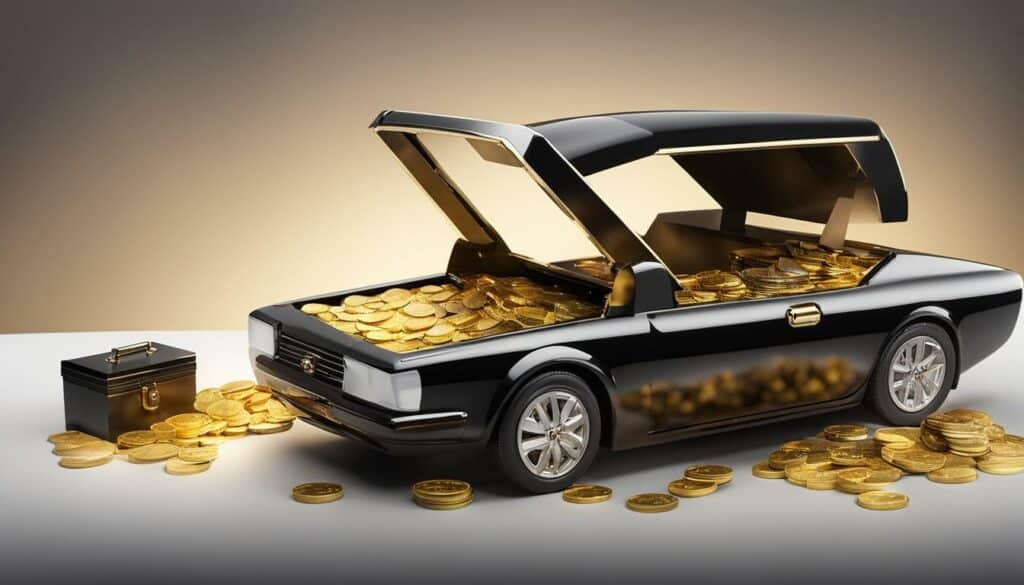Have you faced your car stalling as you hit the gas? It’s annoying and can be unsafe. The reasons for this issue can vary. They might be simple to fix or involve complex engine troubles. We’ll cover the top 10 common reasons your car stalls. Plus, we’ll share solutions to help you drive safely again.
Key Takeaways
- Car stalling can happen for many reasons, like mechanical faults or air and fuel supply issues.
- Empty fuel tank, wrong fuel mix, broken fuel pump, faulty alternator, and weak battery lead to stalling. Problems with the clutch in manual cars, low fuel pressure, clogged air filter, bad coolant sensor, and corroded distributor cap are also culprits.
- Stalling when braking might mean a vacuum hose is blocked in the brake booster, the master cylinder is leaking, or there’s an ABS system leak.
- While driving, a dead alternator, bad coolant sensor, running out of fuel, a big vacuum leak, clogged fuel filter, or a failing fuel pump can cause a stall.
- Simple solutions like using injector cleaner or swapping a dirty air filter might fix stalling. Sometimes, though, you’ll need a pro for the right fix.
Common Causes of Engine Stalling
Engine stalling is a big problem for car owners. It means your car stops suddenly because the engine isn’t working right. There are many reasons why this might happen, and fixing it requires figuring out the exact cause.
One big reason for engine stalling is running out of fuel. Without fuel, your car can’t keep going and will stall. Having the wrong fuel mixture can also cause problems. This happens when there’s too much or not enough fuel mixed with the air.
A broken fuel pump can lead to stalling too. This pump sends fuel to the engine. If it’s not working, the engine won’t get the fuel it needs. Problems with the alternator or battery can also cause stalling. They affect the car’s electrical systems and the engine’s performance.
In cars with manual transmission, issues with the clutch can make the engine stall. This happens when the clutch isn’t working right, messing up the power flow. A clogged fuel filter can also lower fuel pressure, leading to stalling.
There are other reasons too, like a dirty air filter, a broken coolant sensor, and a rusty distributor cap. A dirty air filter limits air flow, affecting the engine. A wrong coolant sensor reading can mess up fuel and ignition settings. A rusty distributor cap messes up the electrical flow, causing the engine to stall.
To fix stalling, it’s important to look at these common causes. Staying on top of maintenance can prevent some issues. But if stalling keeps happening, it’s best to get expert help. Tools like AutoZone’s troubleshooting guide can track down the problem.
Top Common Causes of Engine Stalling:
| Cause | Description |
|---|---|
| Empty Fuel Tank | The car runs out of fuel, leading to a loss of power and stalling. |
| Inadequate Fuel Mixture | A lean or rich air-fuel mixture disrupts combustion and can cause stalling. |
| Faulty Fuel Pump | A malfunctioning fuel pump affects fuel delivery to the engine, resulting in stalling. |
| Bad Alternator | An alternator that is not functioning properly can lead to voltage drops and stalling. |
| Dead or Failing Battery | A weak or dead battery can impact the electrical system, causing engine stalling. |
| Clutch Release Problems | In manual transmission vehicles, clutch issues can disrupt power flow and lead to stalling. |
| Low Fuel Pressure | A clogged fuel filter can result in low fuel pressure, causing the engine to stall. |
| Dirty Air Filter | A dirty air filter restricts airflow to the engine and affects combustion, leading to stalling. |
| Faulty Coolant Sensor | A malfunctioning coolant sensor can result in incorrect fuel and ignition settings, causing stalling. |
| Corroded Distributor Cap | A corroded distributor cap disrupts the distribution of electricity, leading to engine stalling. |
Car Stalling When Braking
It’s really annoying and unsafe when your car stalls as you hit the brakes. This problem can be caused by many things that mess with your car’s smooth running.
A blocked vacuum hose in the brake booster might be the culprit. This part helps you apply the brakes with less effort. If it’s blocked, your car might stall when trying to stop.
The master cylinder could also be leaking. It’s crucial for making the brakes work by managing hydraulic pressure. A leak means less pressure and your car might stall when braking.
Leaks in the ABS (anti-lock braking system) could also make your car stall. ABS keeps your wheels from locking up when braking hard. A leak reduces pressure, causing stalling.
Finding out why your car stalls when braking can be tough on your own. A skilled mechanic can pinpoint and fix the issue. Fixing this fast is vital for your safety and your car’s performance.
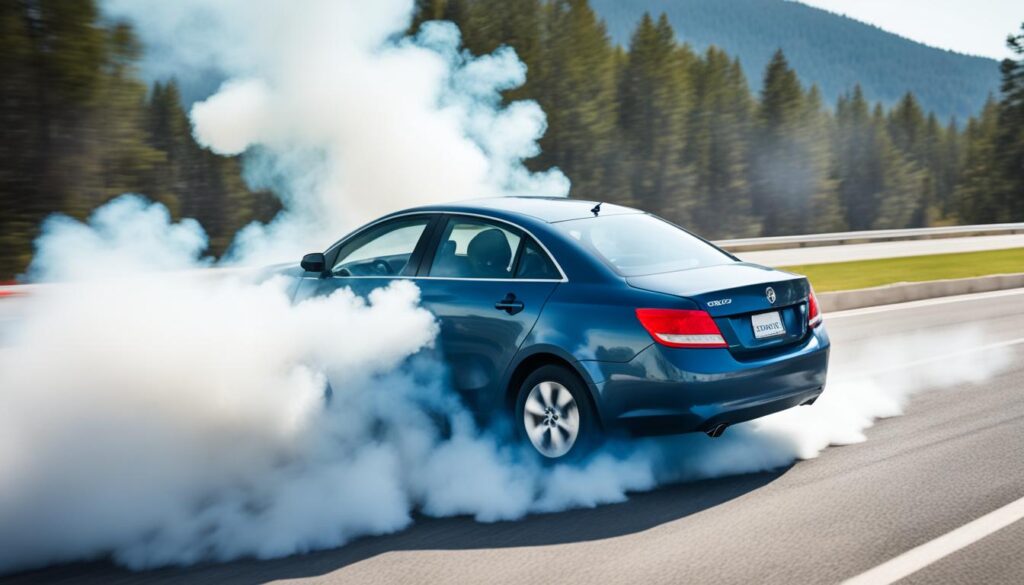
Common Causes of Car Stalling When Braking
| Cause | Description |
|---|---|
| Vacuum Hose Blockage in the Brake Booster | A blockage in the vacuum hose can disrupt the proper functioning of the brake booster, leading to stalling. |
| Leaking Master Cylinder | A leak in the master cylinder can result in a loss of hydraulic pressure, causing the car to stall when braking. |
| Leak in the ABS System | A leak in the ABS system can lead to a loss of hydraulic pressure and cause the car to stall when braking. |
Fixing the root cause of your car stalling when braking brings back its smooth running and safety.
Car Stalling While Driving
There are many reasons why cars stall while driving. Issues could range from a dead alternator, a bad coolant sensor, to less fuel or a big vacuum leak. Understanding these causes is key.
A blocked fuel filter might be the reason your car stalls. Impurities can block the fuel’s flow over time. This leads to engine troubles. A faulty fuel pump also prevents enough fuel from reaching the engine, causing it to stall.
A car might stall because there’s not enough fuel in the tank. Make sure your car always has enough fuel to prevent stalling.
The alternator also plays a big role. It charges the battery and powers the car’s electrical systems. A bad alternator leads to electrical problems and stalling.
A problem with the coolant sensor can also cause your car to stall. This sensor checks the engine’s temperature. If it’s not working right, the fuel mixture gets messed up, causing the engine to stall.
Figuring out why your car is stalling can be tough. It’s best to get help from a professional mechanic. They have the skills and tools to find and fix the problem.
If your car stalls while you’re driving, call a trusted mechanic. They can find and fix the issue. This makes your car safe and smooth to drive again.
Preventing Car Stalling While Driving: Maintenance Tips
To reduce stalling, follow these maintenance tips:
- Regularly check and replace clogged or dirty fuel filters.
- Keep your fuel tank adequately filled.
- Maintain your alternator and ensure it is functioning properly.
- Monitor the coolant levels and have the coolant sensor checked if necessary.
Stay ahead with your car’s maintenance. React quickly to any warning signs. This way, you’re less likely to deal with stalling.
Now you know what causes car stalling. Next, we’ll talk about how to fix it.
| Common Causes of Car Stalling While Driving | Solutions |
|---|---|
| Clogged fuel filter | Regularly check and replace clogged or dirty fuel filters. |
| Faulty fuel pump | Have a professional mechanic inspect and replace a faulty fuel pump if necessary. |
| Dead alternator | Ensure the alternator is in good working condition or have it replaced by a qualified mechanic. |
| Bad coolant sensor | Have the coolant sensor tested and replaced if it is malfunctioning. |
Next Steps: How to Fix a Stalling Vehicle
How to Fix a Stalling Vehicle
When faced with a stalling vehicle, I know it can feel frustrating and worrying. Yet, troubleshooting can identify and solve the problem. I suggest starting with simple checks then moving to complex issues.
Ruling Out Simple Issues
First, always see if you’ve run out of fuel. It’s easy to overlook but can cause engine stalls. Also, check your clutch use as it can lead to stalling if not used right.
Assessing the Battery and Alternator
If simple issues aren’t to blame and your car still stalls, look at the battery and alternator. A weak battery, especially an old one, might make the engine stall. Check for signs of wear and if needed, test or replace the battery.
A broken alternator can also cause electrical problems and stalling. But, if there’s no clear sign of alternator failure, it might not be why the engine stalls.
Other Potential Fixes
If the battery and alternator are okay, other fixes might work. Adding injector cleaner might help if your vehicle stalls on inclines.
A clogged air filter could also cause stalling. Dust and debris might block airflow to the engine. Check and replace the air filter if it’s dirty.
Note: Remember, these steps might offer a quick fix, but professional help is best for a lasting solution. A certified mechanic can do a full check and solve the real issue.
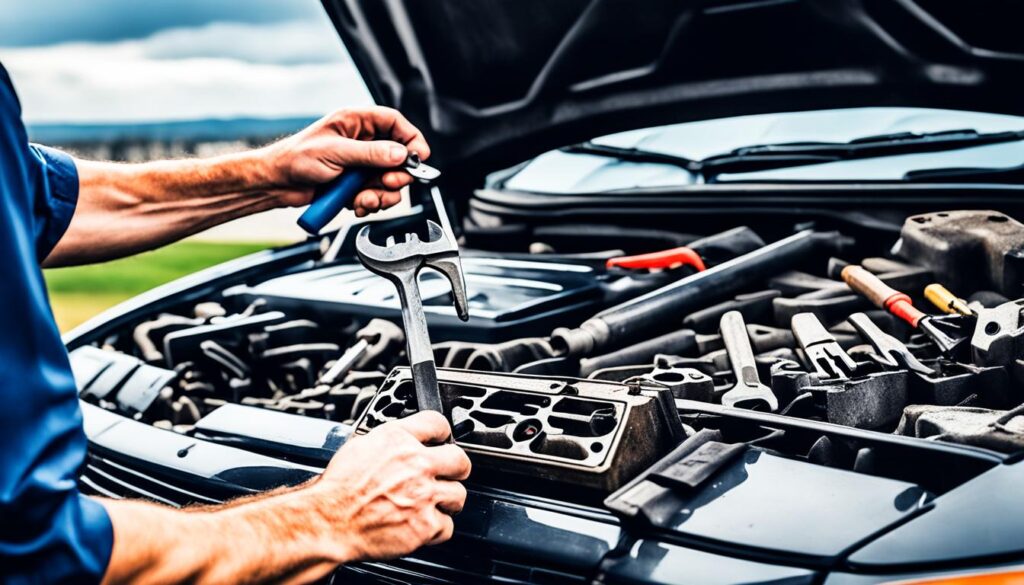
The Role of the Alternator in Car Stalling
The alternator is vital for a car’s electrical system. It converts mechanical energy into electrical energy. This powers the engine and other components. But, a bad alternator can cause voltage drops. This may lead to car engine stalling.
A faulty alternator means the engine gets less power. This can make the car stall, drain the battery quickly, and make lights flicker. Knowing the signs of a bad alternator can help you fix the issue fast.
Car stalls often point to alternator problems. Signs include dim headlights, a dead battery, starting issues, or odd engine noises.
If your car stalls often or shows these signs, fixing the alternator is crucial. Ignoring it can harm the electrical system and other parts.
Replacing a bad alternator is essential. It’s best to work with a certified mechanic. They have the skills and tools to correctly replace the alternator. They ensure it matches the car’s needs.
| Signs of a Bad Alternator | Effects on the Car |
|---|---|
| Dimming headlights or interior lights | Loss of electrical power |
| Dead or weak battery | Inability to start the car |
| Strange noises (e.g., grinding or whining) | Potential damage to other components |
Dealing with a bad alternator quickly keeps your car’s electrical system reliable. Regular check-ups can spot early problems. This prevents bigger issues later.
For more on car stalling, check carfromjapan.com. It explains stalling causes and how to fix them.
Fuel System Issues and Car Stalling
Car stalling often comes down to fuel system troubles. This system has many parts. They work together to give fuel for the engine’s combustion. If any part fails, your car might stall while driving. This is both annoying and unsafe.
A common cause for stalling is losing fuel pressure. This might happen if a fuel filter gets clogged or a fuel pump fails. A dirty filter slows down fuel getting to the engine. This means not enough combustion. You can often fix stalling by changing the clogged fuel filter.
But, if your car keeps stalling after you changed the filter, the issue might be the fuel pump. This pump moves fuel to the engine. If it’s failing, the fuel won’t flow right. This causes the engine to misfire and stall. Changing a failing fuel pump is a job for experts. They must get to the pump inside the fuel tank.
It’s key to fix fuel system problems quickly to keep your car running well. Regular checks and maintenance help avoid these issues. If your car stalls a lot and you think it’s the fuel system, get a pro mechanic to look at it. They can find and fix the issue correctly.
Role of Sensors in Car Stalling
Sensors are key parts in cars that detect and monitor different conditions. They help prevent car stalling by ensuring the right mix of fuel and air. Malfunctioning sensors can cause engine issues and lead to stalling.
The MAP and MAF sensors are crucial in stopping cars from stalling. The MAP sensor checks intake manifold pressure. It helps adjust fuel injection. The MAF sensor calculates the air entering the engine. Incorrect readings from these sensors can mess up fuel mixtures, causing stalling.
Other sensors like the coolant temperature sensor also play a role. It checks the engine’s temperature. A broken sensor can send wrong signals, leading to stalling.
The TPS is important too. It tells the ECU about the accelerator pedal’s position. Faulty TPS readings can cause fuel and engine issues, which might stall the car.
When fixing car stalls, considering sensor health is vital. If you think there’s a sensor problem, see a professional. They can diagnose and fix sensor issues. This might resolve stalling and improve engine function.
| Sensor | Function |
|---|---|
| Manifold Absolute Pressure Sensor (MAP) | Measures intake manifold pressure to adjust fuel injection and maintain proper fuel-to-air mixture. |
| Mass Air Flow Sensor (MAF) | Measures the mass of air entering the engine, enabling the calculation of correct fuel quantity. |
| Engine Coolant Temperature Sensor | Monitors the engine’s temperature and signals the ECU to adjust fuel delivery. |
| Throttle Position Sensor (TPS) | Provides information about the position of the accelerator pedal, enabling the adjustment of fuel and ignition timing. |
Understanding sensors’ roles in car stalling is important. Keeping them in good shape can prevent stalling. Regular checks and fixing sensor issues will ensure a smooth ride.
For more on fixing car stalls, check this guide on car stalling reasons and solutions.
Conclusion
Having your car stall when you speed up can be really annoying and unsafe. You can try some simple fixes yourself. But many stalling issues need a skilled mechanic’s eye for a correct fix. Fixing the main cause is key for your car’s safe and smooth running.
When your car stalls as you speed up, getting a pro’s help is wise. Certified mechanics know how to spot the problem, be it a bad sensor, fuel issues, or alternator trouble. They can fix it so your car works well again.
It’s important to keep your car safe and working right. Fixing a stalling car is not easy, as it has many complex parts. If you’re facing this, a skilled mechanic can surely help. They’ll make sure your car runs smoothly and safely.
